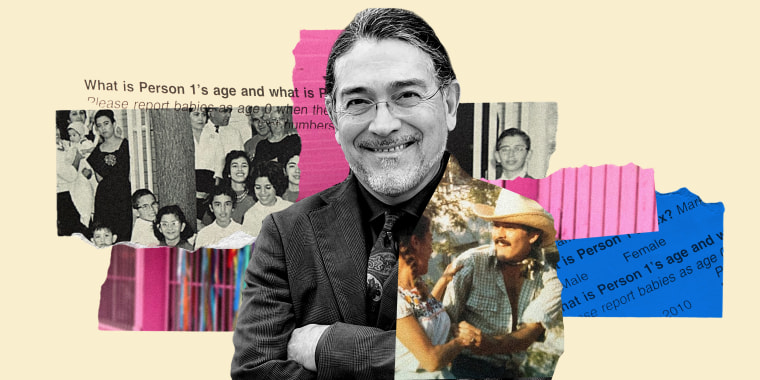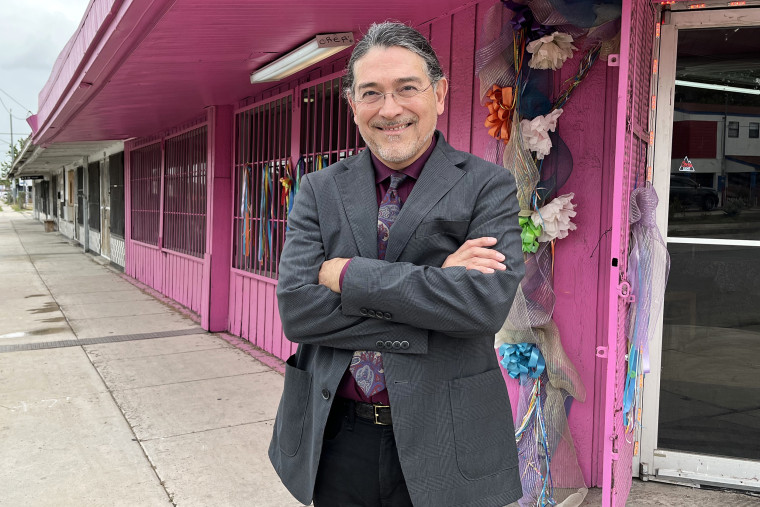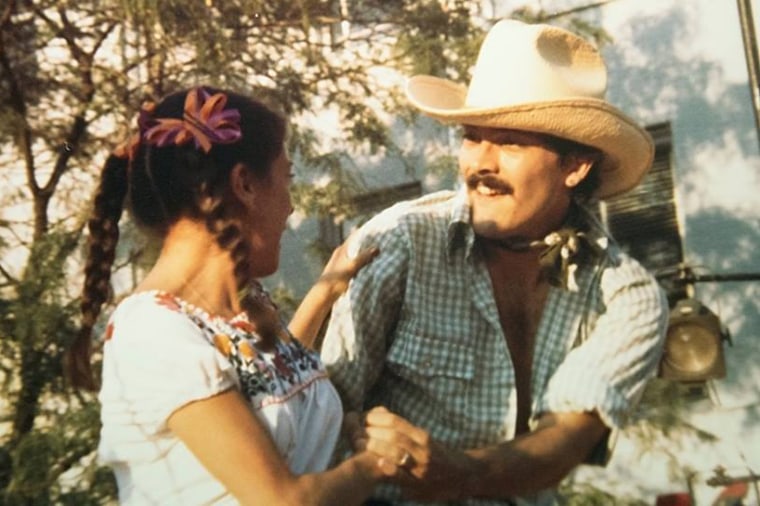Robert Santos, the first Latino to lead the Census Bureau, is out to repair America's trust after Trump tried, in his words, to "sabotage" the census.

Anjali Nair / NBC News; Getty Images; Family photos
Aug. 28, 2022,
By Suzanne Gamboa
SAN ANTONIO — As a young boy, Robert Santos would snatch bits of his mom's tortilla masa (dough) and use it instead of worms to fish at Woodlawn Lake, near his family's home here.
Later on, when he saw photographers shooting photos of bands at an Austin City Limits Festival concert, he found a way to get closer to the music as a part-time South by Southwest photographer.
Now Santos is the first Latino — he identifies as a Chicano and writes in mestizo on census forms — to head the U.S. Census Bureau. Having just passed the halfway point in the first year of his five-year appointment, he has set about introducing himself to America as the "face of the census."
Aug. 28, 2022,
By Suzanne Gamboa
SAN ANTONIO — As a young boy, Robert Santos would snatch bits of his mom's tortilla masa (dough) and use it instead of worms to fish at Woodlawn Lake, near his family's home here.
Later on, when he saw photographers shooting photos of bands at an Austin City Limits Festival concert, he found a way to get closer to the music as a part-time South by Southwest photographer.
Now Santos is the first Latino — he identifies as a Chicano and writes in mestizo on census forms — to head the U.S. Census Bureau. Having just passed the halfway point in the first year of his five-year appointment, he has set about introducing himself to America as the "face of the census."

Roberto Santos as a photographer for SXSW.Courtesy Roberto Santos
With wire-frame glasses, silver-and-black hair pulled into a pony tail and an often gleeful smile, Santos looks more like a poet or a Chicano studies professor than a nationally renowned statistician who is setting up the bureau for the next decennial census, in 2030.
“I made a deliberate decision not to go out and get sort of the New York business suit and cut-my-hair type of thing. It was critical for me to be who I am and present myself as pure as I am,” Santos told NBC News in an interview at Diana’s Burgers, not far from where he’d use the masa to fish for catfish and perch.
His everyman persona and Latino background may be what is needed after the Trump administration was accused of trying to use the 2020 census for political gain.
The administration tried to add a citizenship question to the census, which was seen as an attempt to suppress Latino and other votes by making people afraid to respond and prevent noncitizens from being counted in redrawing of voting maps.
With wire-frame glasses, silver-and-black hair pulled into a pony tail and an often gleeful smile, Santos looks more like a poet or a Chicano studies professor than a nationally renowned statistician who is setting up the bureau for the next decennial census, in 2030.
“I made a deliberate decision not to go out and get sort of the New York business suit and cut-my-hair type of thing. It was critical for me to be who I am and present myself as pure as I am,” Santos told NBC News in an interview at Diana’s Burgers, not far from where he’d use the masa to fish for catfish and perch.
His everyman persona and Latino background may be what is needed after the Trump administration was accused of trying to use the 2020 census for political gain.
The administration tried to add a citizenship question to the census, which was seen as an attempt to suppress Latino and other votes by making people afraid to respond and prevent noncitizens from being counted in redrawing of voting maps.

Roberto Santos outside Diana’s Burgers.Suzanne Gamboa for NBC News
The Supreme Court kept the citizenship question off the census, but Trump tried other ways for the bureau to get citizenship information. He also stopped the census headcount early. Those efforts left a number of Latinos and others nervous about filling out the census and skeptical of its results.
When the Trump interference was happening, Santos was chief methodologist at the Urban Institute and president-elect of the American Statistical Association. He publicly said that he expected the 2020 census to be “one of the most flawed censuses in history” and that it was being “sabotaged.”
Santos said his criticism was rooted in his own respect for the census and for numbers. Throughout much of his lifetime, he has worked with census data and its people.
“It’s an issue of scientific integrity, transparency and independence," he said.
He also credited the Census Bureau for doing its job during that time.
"And it so happened that the career staff … actually did what they needed to do to make sure that the scientific integrity of the census was preserved," he said.
The Supreme Court kept the citizenship question off the census, but Trump tried other ways for the bureau to get citizenship information. He also stopped the census headcount early. Those efforts left a number of Latinos and others nervous about filling out the census and skeptical of its results.
When the Trump interference was happening, Santos was chief methodologist at the Urban Institute and president-elect of the American Statistical Association. He publicly said that he expected the 2020 census to be “one of the most flawed censuses in history” and that it was being “sabotaged.”
Santos said his criticism was rooted in his own respect for the census and for numbers. Throughout much of his lifetime, he has worked with census data and its people.
“It’s an issue of scientific integrity, transparency and independence," he said.
He also credited the Census Bureau for doing its job during that time.
"And it so happened that the career staff … actually did what they needed to do to make sure that the scientific integrity of the census was preserved," he said.

Roberto performs a folklorico dance with his wife, Adella.
Courtesy Roberto Santos
In the 2020 census, 4.99 of every 100 Hispanics were not counted, the bureau has said. There were high undercount rates for Native Americans (5.64%) and Blacks (3.3%), too. Even putting aside those not counted, Latinos are considered to have driven about 51 percent of the nation's growth in the past decade.
Santos’ 40-year career has included forming his own social science firm, NuStats, in Austin, Texas; serving as a vice president of the National Opinion Research Center (NORC) at the University of Chicago; and working as a senior study director at Temple University’s Institute for Survey Research.
Before he became president of the American Statistical Association in 2021, Santos was also president of the American Association for Public Opinion Research in 2013-14.
He had to give up the photography side gig with SXSW when he joined the administration, he said.
For just about all of his career, Santos has been marrying his statistical and data knowledge with helping underrepresented communities.
His approach to steering the census post-Trump is to cultivate relationships and do as much outreach to communities and different people as possible to move beyond the upheaval of the 2020 census.
The bureau is currently working on an economic census it plans to launch in January with all sorts of data on about 4 million businesses, from revenue to output issues, to help with supply chain assessments, he said.
Santos said he doesn't want to put a personal stamp on the bureau, but rather to be a catalyst for excellence from a staff of varying races, ethnicities and backgrounds. He wants to see them collect data and return to communities with relevant information so they can use it for their benefit.
“I know the Census Bureau, I know the culture and I know how things work," Santos said. "I also know it would be a waste of time to go in as a bull in a china shop."
In the 2020 census, 4.99 of every 100 Hispanics were not counted, the bureau has said. There were high undercount rates for Native Americans (5.64%) and Blacks (3.3%), too. Even putting aside those not counted, Latinos are considered to have driven about 51 percent of the nation's growth in the past decade.
Santos’ 40-year career has included forming his own social science firm, NuStats, in Austin, Texas; serving as a vice president of the National Opinion Research Center (NORC) at the University of Chicago; and working as a senior study director at Temple University’s Institute for Survey Research.
Before he became president of the American Statistical Association in 2021, Santos was also president of the American Association for Public Opinion Research in 2013-14.
He had to give up the photography side gig with SXSW when he joined the administration, he said.
For just about all of his career, Santos has been marrying his statistical and data knowledge with helping underrepresented communities.
His approach to steering the census post-Trump is to cultivate relationships and do as much outreach to communities and different people as possible to move beyond the upheaval of the 2020 census.
The bureau is currently working on an economic census it plans to launch in January with all sorts of data on about 4 million businesses, from revenue to output issues, to help with supply chain assessments, he said.
Santos said he doesn't want to put a personal stamp on the bureau, but rather to be a catalyst for excellence from a staff of varying races, ethnicities and backgrounds. He wants to see them collect data and return to communities with relevant information so they can use it for their benefit.
“I know the Census Bureau, I know the culture and I know how things work," Santos said. "I also know it would be a waste of time to go in as a bull in a china shop."
No comments:
Post a Comment